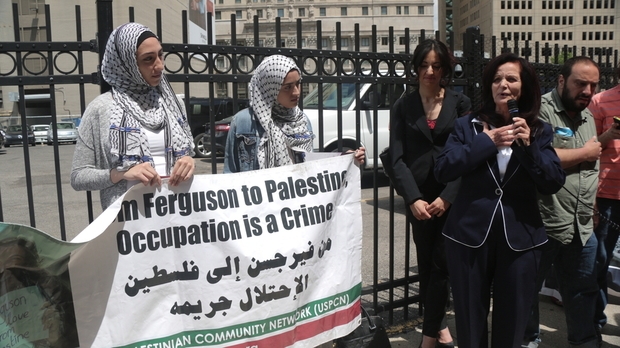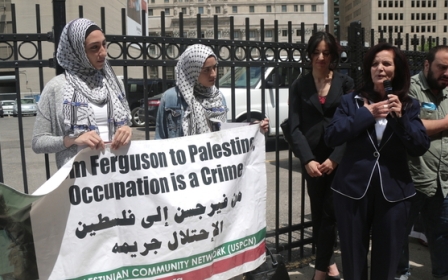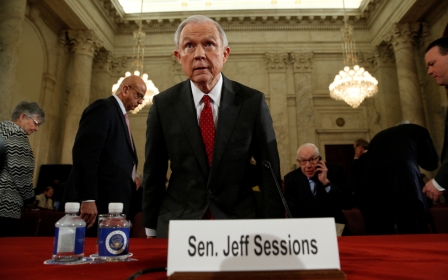Rasmea Odeh accepts plea deal, avoiding jail

Palestinian activist Rasmea Odeh has accepted a plea deal that would end her long legal battle with the US government.
As part of the agreement, Odeh will avoid prison time but lose her US citizenship and leave the country.
In 2014, Odeh was convicted of unlawful procurement of US citizenship and sentenced to 18 months in prison. That conviction, however, was overturned by a court of appeals last year.
'As a Palestinian who has dedicated her life to the cause of liberation, it is impossible for Rasmea to expect a fair trial in US courts'
- The Rasmea Defense Committee
Odeh, 69, was charged because she failed to disclose on her US naturalisation application that she was jailed for 10 years in Israel after a military court found her guilty of involvement in a 1969 supermarket bombing in Jerusalem. She says the Israeli case was based on a forced confession obtained by torture that included sexual assault.
She won appeal in the US case because the judge had omitted evidence of torture in Israel from her 2014 trial. The defence wanted to argue that Odeh suffers from post-traumatic stress disorder, which affected her mental state while answering the naturalisation form questions.
The Rasmea Defense Committee said in a statement that avoiding jail was a “victory” for Odeh.
The committee cited the slim chances for acquittal in a new trial, which was set for May.
“As a Palestinian who has dedicated her life to the cause of liberation, it is impossible for Rasmea to expect a fair trial in US courts,” the group said in a statement.
The prosecution had added an indictment that frames the accusations against Odeh as terrorism, rather than immigration fraud.
The defence committee also said the prosecution may be more vicious under the "regime of racist Attorney General Jeff Sessions".
"There is the great likelihood that a jury would be prejudiced by hearing the Zionist Assistant US Attorney Jonathan Tukel call Rasmea a 'terrorist' and her supporters 'mobs and hordes,' as he has done many times before," the statement said.
There was also the fear that Odeh would be held by immigration authorities after serving her sentence if she was convicted.
'She's going to continue her organising work when she leaves, wherever that next stage in her life takes her'
- Hatem Abudayyeh
“Under this current, racist political climate, and facing 18 months or more of imprisonment, as well as the possibility of indefinite detention by Immigration and Customs Enforcement (ICE), Rasmea has made the difficult decision to accept a plea agreement,” the defence committee said.
Odeh’s supporters had organised a political movement around her case, holding protests outside the courthouse in Detroit each time she appeared before a judge.
They believed the charges against her were politically motivated - a “witch hunt” aimed to deal a blow to Palestinian activism in the United States.
US Judge Gershwin Drain will set a date to consider the plea agreement. Odeh’s supporters have vowed to gather in Detroit to stand with the Palestinian activist on what could be her last day in US court.
'Strong woman'
Hatem Abudayyeh, a leader in the Rasmea Defense Committee, said Odeh herself made the decision to take the plea deal.
He said the prosecution's "vindictive ploy" to bring up the terrorism indictment made it even more difficult to have a fair trial in the current US political climate with an administration in the White House that is "anti-immigrant, anti-Arab and anti-Muslim".
The details of what happens next to Odeh are unclear, Abudayyeh said. After the judge approves the plea deal, it is not known how much time she will have in the country.
The 69-year-old activist has a Jordanian passport, but she has not decided what her next destination will be, according to Abudayyeh.
"She's doing well; Rasmea is a strong woman, and she's a very smart and strategic and political woman," Abudayyeh told MEE. "She recognises this is a political case. She didn't miss a day of work after her arrest. She's been fighting for justice."
He added that the plea deal is not the end of Odeh's activism.
"She's going to continue her organising work when she leaves, wherever that next stage in her life takes her," Abudayyeh continued. "Wherever it is that she goes, I guarantee you that within a few months, there's going to be a women's committee built in whatever city or country that she's at, and those women will work with her to continue the struggle for social justice."
Odeh was supported by notable African American activists and scholars, including Angela Davis and Marc Lamont Hill. Her rallies often showcased a myriad of organisations and ideologies, including progressive leftists, immigrant rights groups, LGBT advocates and feminist activists.
Abudayyeh stressed the importance of building coalitions and standing up against injustices perpetrated by the government.
“We cannot sit back and allow the attacks from the US government in unequivocal support of the Israeli violations of Palestinian rights - we can’t sit back and just allow them to attack us without fighting back,” he said.
He lauded the lawyers in the social justice movement, including Odeh’s attorneys, and highlighted the role of activism.
“We would not have won the victories that we won; we would not have been able to project this case nationally and internationally like we did unless you fight as an organiser to publicise the case, to defend the rights of the target - in this case Rasmea- and work to broaden the movement,” he said.
New MEE newsletter: Jerusalem Dispatch
Sign up to get the latest insights and analysis on Israel-Palestine, alongside Turkey Unpacked and other MEE newsletters
Middle East Eye delivers independent and unrivalled coverage and analysis of the Middle East, North Africa and beyond. To learn more about republishing this content and the associated fees, please fill out this form. More about MEE can be found here.




